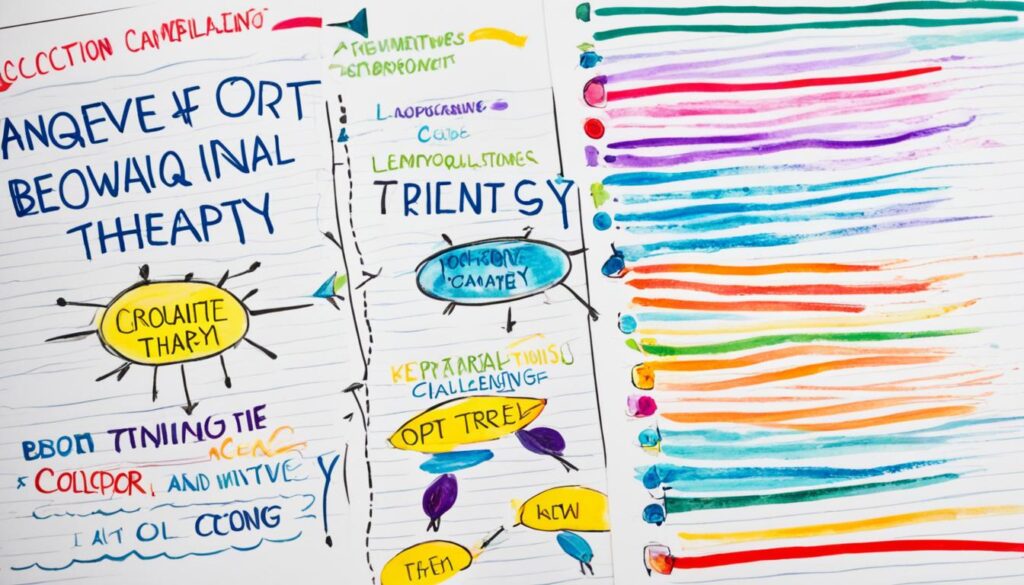medical treatments for anxiet can significantly impact a person’s daily life, causing distress, worry, and a sense of unease. If you or someone you know is struggling with anxiety, it’s essential to explore the various medical treatments available that can provide much-needed relief. In this section, we will dive into the world of medical treatments for anxiety disorders and discuss their effectiveness in managing symptoms.
Key Takeaways: medical treatments for anxiety
- Medical treatments play a crucial role in managing symptoms of anxiety disorders.
- It is important to consult with a healthcare professional to determine the most suitable treatment approach.
- Medications such as benzodiazepines and antidepressants can alleviate anxiety symptoms and promote a sense of calmness.
- Cognitive Behavioral Therapy (CBT) is a highly effective psychological treatment for anxiety disorders.
- Individualized treatment plans that consider the specific needs of each individual are essential for successful anxiety management.
Understanding Anxiety Disorders
Before exploring the medical treatments available for anxiety disorders, it is essential to have a clear understanding of these conditions. Anxiety disorders encompass a range of mental health disorders characterized by excessive and persistent feelings of anxiety or fear. Let’s delve into the different types of anxiety disorders:
1. Generalized Anxiety Disorder (GAD)
Generalized anxiety disorder is defined by chronic and excessive worry about various aspects of life, such as work, health, and relationships. Individuals with GAD often experience physical symptoms like restlessness, difficulty concentrating, muscle tension, and sleep disturbances.
2. Panic Disorder
Panic disorder is characterized by recurring panic attacks, which are sudden and intense episodes of fear. These panic attacks can happen unexpectedly and are accompanied by physical symptoms such as heart palpitations, shortness of breath, trembling, and dizziness.
3. Social Anxiety Disorder
Social anxiety disorder, also known as social phobia, involves an intense fear of social situations. It often leads to avoidance of social interactions due to the fear of embarrassment or judgment. Physical symptoms may include blushing, sweating, trembling, and a rapid heartbeat.
4. Separation Anxiety Disorder
Separation anxiety disorder is typically observed in children but can also affect adults. It is characterized by excessive anxiety related to separation from attachment figures, such as parents or caregivers. Symptoms may include distress when separated, nightmares, and reluctance to attend school or work.
5. Obsessive-Compulsive Disorder (OCD)
Obsessive-compulsive disorder is a condition marked by recurring intrusive thoughts (obsessions) and repetitive behaviors or mental acts (compulsions) performed to alleviate the anxiety caused by these obsessions. Common obsessions include fears of contamination, symmetry, or harming oneself or others.
6. Post-Traumatic Stress Disorder (PTSD)
Post-traumatic stress disorder can develop after experiencing or witnessing a traumatic event. Individuals with PTSD may have intrusive memories, nightmares, flashbacks, and intense anxiety or distress related to the traumatic event. Emotional numbness and avoidance of triggers are also common.
By familiarizing ourselves with these various anxiety disorders, we can gain a better understanding of the unique challenges faced by individuals dealing with anxiety. Now that we have a foundation in place, we can explore the available medical treatments in the next section.
Common Symptoms of Anxiety
Anxiety disorders can have a range of symptoms, both physical and psychological. Recognizing these symptoms can be crucial in understanding and addressing anxiety. Here are some common symptoms experienced by individuals with anxiety disorders:
- Anxiety Symptoms: Individuals with anxiety may experience frequent feelings of apprehension, nervousness, or a sense of impending doom. These feelings can be intense and persistent.
- Physical Symptoms of Anxiety: Anxiety can manifest physically, leading to symptoms such as increased heart rate, chest pain, shortness of breath, trembling, sweating, and gastrointestinal issues.
- Psychological Symptoms of Anxiety: Anxiety can also impact psychological well-being. Some common psychological symptoms include excessive worrying, irritability, difficulty concentrating, restlessness, and sleep disturbances.
Increased Heart Rate
One of the physical symptoms commonly associated with anxiety is an increased heart rate. When experiencing anxiety, the body’s fight-or-flight response is activated, leading to a rapid heartbeat. This can be a distressing symptom for individuals and may exacerbate their anxiety further.
Shortness of Breath
Shortness of breath is another physical symptom frequently experienced by individuals with anxiety disorders. It can be described as a feeling of tightness or heaviness in the chest, making it challenging to breathe normally. This symptom can contribute to feelings of panic and anxiety.
Excessive Worrying
Excessive worrying is a common psychological symptom in individuals with anxiety. Those with anxiety disorders often find it difficult to control their worrying, with thoughts racing through their minds. This persistent anxiety can interfere with daily activities and cause distress.
Restlessness
A sense of restlessness is another psychological symptom associated with anxiety. Individuals may find it challenging to sit still or relax, constantly feeling the need to move or engage in activities. Restlessness can contribute to a sense of unease and constant tension.
Difficulty Concentrating
Anxiety can significantly affect an individual’s ability to concentrate. Those with anxiety disorders often find their attention easily distracted and may struggle to focus on tasks or make decisions. This difficulty concentrating can impact various aspects of life, including work, school, and personal relationships.

Understanding and recognizing the common symptoms of anxiety is essential in seeking appropriate help and support. If you or someone you know is experiencing these symptoms, it is recommended to consult with a healthcare professional for a proper diagnosis and treatment plan.
Medication Options for Anxiety
Medication can be an effective part of the treatment plan for anxiety disorders. When combined with therapy or other interventions, certain medications can help alleviate symptoms and improve overall well-being. The types of medications commonly prescribed for anxiety include benzodiazepines, antidepressants, and selective serotonin reuptake inhibitors (SSRIs).
Benzodiazepines
Benzodiazepines are a class of medications that are commonly used for short-term relief of anxiety symptoms. They work by enhancing the activity of a neurotransmitter called gamma-aminobutyric acid (GABA), which produces a calming effect on the brain. Examples of benzodiazepines include:
| Common Benzodiazepines | Brand Names |
|---|---|
| Diazepam | Valium |
| Alprazolam | Xanax |
| Lorazepam | Ativan |
| Clonazepam | Klonopin |
While benzodiazepines can be helpful in managing anxiety symptoms, they are typically prescribed for short-term use due to the potential for dependence and withdrawal symptoms.
Antidepressants
Antidepressants are another class of medications commonly used to treat anxiety disorders. These medications work by affecting the balance of chemicals in the brain, such as serotonin and norepinephrine. Antidepressants may take several weeks to start alleviating symptoms. Some commonly prescribed antidepressants for anxiety include:
| Common Antidepressants | Brand Names |
|---|---|
| Fluoxetine | Prozac |
| Sertraline | Zoloft |
| Escitalopram | Lexapro |
| Paroxetine | Paxil |
Antidepressants can be particularly helpful for individuals who have both anxiety and depression.
Selective Serotonin Reuptake Inhibitors (SSRIs)
SSRIs are a specific class of antidepressants that are often used to treat anxiety disorders. They primarily work by increasing the availability of serotonin, a neurotransmitter that helps regulate mood. SSRIs are considered a first-line treatment for anxiety disorders due to their effectiveness and relatively few side effects. Some commonly prescribed SSRIs include:
| Common SSRIs | Brand Names |
|---|---|
| Fluoxetine | Prozac |
| Sertraline | Zoloft |
| Escitalopram | Lexapro |
| Paroxetine | Paxil |
SSRIs are generally well-tolerated, but it may take several weeks for their full effect to be realized.
It’s important to note that different individuals may respond differently to medications, and the choice of medication should be based on a careful assessment by a healthcare professional. Additionally, medication alone is not a comprehensive solution for anxiety disorders. Therapy and other interventions often play an important role in anxiety management.

Cognitive Behavioral Therapy (CBT) for Anxiety
Cognitive Behavioral Therapy (CBT) is a widely recognized and proven psychological treatment for anxiety disorders. It focuses on helping individuals identify and modify negative thought patterns and behaviors that contribute to anxiety. By addressing these underlying factors, CBT empowers individuals to develop healthier coping mechanisms and reduce anxiety symptoms.
CBT is a structured and goal-oriented therapy approach. It involves working collaboratively with a trained therapist to gain a deeper understanding of one’s anxiety triggers and explore the thoughts and beliefs associated with anxiety. Through targeted interventions and exercises, individuals learn to challenge and reframe distorted thoughts, replacing them with more balanced and realistic ones.
The benefits of CBT extend beyond alleviating current anxiety symptoms. This evidence-based therapy equips individuals with essential skills and tools to manage anxiety even after therapy concludes. It provides individuals with the ability to recognize unhealthy patterns of thinking and implement effective strategies to prevent relapse.
“CBT can be a transformative tool in the treatment of anxiety disorders. By addressing the root causes of anxiety and empowering individuals with practical skills, it offers long-term solutions and improved quality of life.” – Dr. Emily Thompson, Licensed Clinical Psychologist
CBT can be used as a standalone treatment or combined with medication, depending on the individual’s needs and treatment plan. This combination of psychotherapy and medication is often referred to as integrated treatment and has been shown to be highly effective in managing anxiety disorders.
It is important to note that CBT requires consistent effort and commitment from individuals. Engaging in therapy sessions and actively participating in between-session exercises are crucial for achieving meaningful results. CBT is often provided in a structured format, with a set number of sessions tailored to the individual’s needs and progress.
CBT for anxiety can help individuals:
- Identify and challenge negative thought patterns
- Develop effective coping strategies
- Improve problem-solving skills
- Gradually confront anxiety-provoking situations through exposure

CBT: A Collaborative Approach
One of the strengths of CBT is its collaborative nature. Therapists work closely with individuals to establish treatment goals and create an individualized treatment plan. This partnership, built on trust and mutual respect, promotes a supportive and empowering therapeutic environment.
By actively involving individuals in their own treatment, CBT fosters a sense of ownership and personal growth. Together, therapists and individuals explore the underlying causes of anxiety, develop strategies to manage symptoms, and promote positive change.
CBT’s effectiveness is supported by extensive research and has been widely endorsed by mental health professionals as a first-line treatment for anxiety disorders. Its structured and practical approach makes it accessible to individuals of all ages and backgrounds.
Other Psychological Treatments for Anxiety
In addition to Cognitive Behavioral Therapy (CBT), there are various other psychological treatments that can effectively help individuals manage their anxiety. These treatments can be implemented alongside medication or as standalone approaches, depending on the individual’s needs and preferences.
Relaxation Techniques
Relaxation techniques are valuable tools in reducing anxiety symptoms and promoting a sense of calmness. These techniques focus on activating the body’s relaxation response, counteracting the physiological effects of anxiety. Examples of relaxation techniques include deep breathing exercises, progressive muscle relaxation, meditation, and guided imagery. Incorporating these techniques into daily routines can provide individuals with a sense of control over their anxiety.
Support Groups
Support groups offer individuals with anxiety a safe space to share their experiences, receive emotional support, and gain insights from others facing similar challenges. Interacting with individuals who understand and empathize with their struggles can be highly beneficial for managing anxiety. Support groups can be both in-person and online, providing a platform for connecting with like-minded individuals and learning coping strategies from one another.
Anxiety Management Techniques
Anxiety management techniques encompass a wide range of strategies aimed at reducing the overall impact of anxiety on daily life. These techniques may involve challenging negative thought patterns, developing healthy coping mechanisms, and implementing stress management practices. By learning to identify triggers and implementing specific techniques, individuals can effectively manage their anxiety symptoms and prevent them from escalating.
By exploring these additional psychological treatments, individuals can expand their arsenal of anxiety management tools. Incorporating relaxation techniques, seeking support through support groups, and implementing anxiety management techniques can contribute to reducing anxiety symptoms and improving overall well-being.
Developing a Treatment Plan for Anxiety
When it comes to treating anxiety, a personalized and comprehensive treatment plan is essential for long-term success. Collaborating with a healthcare professional is crucial in developing a treatment plan that meets your specific needs. The plan takes into account factors such as the type of anxiety disorder, the severity of symptoms, and the course of treatment.
One of the first steps in developing a treatment plan is an accurate diagnosis of the type of anxiety disorder you are experiencing. This is typically done through a thorough evaluation by a healthcare professional, which may include a review of your medical history, a physical examination, and psychological assessments.
Once the diagnosis is established, the healthcare professional will work with you to determine the most suitable course of treatment. This may involve a combination of medication, therapy, and lifestyle changes. The type of anxiety disorder you have will significantly influence the treatment approach.
Also Read:- Understanding Medical Diagnosis Essentials
For example, someone with generalized anxiety disorder may benefit from medications such as selective serotonin reuptake inhibitors (SSRIs) or serotonin-norepinephrine reuptake inhibitors (SNRIs), which help regulate neurotransmitters in the brain. Additionally, a form of therapy called cognitive-behavioral therapy (CBT) may be recommended, which helps individuals identify and reframe negative thought patterns.
On the other hand, someone with panic disorder may receive treatment that includes benzodiazepines, which provide rapid relief during panic attacks. Gradual exposure therapy, a technique used in CBT, is also commonly used to help individuals confront and overcome their fear of panic attacks.
“A comprehensive treatment plan for anxiety involves collaborating with a healthcare professional to determine the most suitable approach.”
It’s important to note that the course of treatment may vary depending on individual needs and preferences. Some individuals may find relief from anxiety symptoms within a few months of treatment, while others may require longer-term management. Your healthcare professional will discuss the expected duration of treatment and monitor your progress regularly to ensure the treatment plan is effective.
Throughout the treatment process, it is essential to communicate openly with your healthcare professional. If you have any concerns or experience any side effects from medications, it is crucial to bring them up during your appointments. Your healthcare professional will work with you to make any necessary adjustments to your treatment plan.
The Benefits of a Treatment Plan for Anxiety
A well-developed treatment plan provides structure and guidance to individuals living with anxiety. It ensures a systematic approach to managing symptoms and improving overall well-being. Having a treatment plan in place can offer a sense of control and support, enhancing the effectiveness of your journey towards recovery.

A treatment plan for anxiety is a roadmap to success, outlining the methods and strategies that will be utilized to address your specific needs. It offers a sense of direction and empowerment, making it easier to navigate through the challenges of anxiety disorders.
In conclusion, developing a treatment plan for anxiety is a collaborative process between individuals and healthcare professionals. It involves accurate diagnosis, consideration of the type of anxiety disorder, and the development of a personalized course of treatment. By following a comprehensive treatment plan, individuals can experience relief from symptoms and improve their overall quality of life.
Finding the Best Treatment for You
When it comes to treating anxiety disorders, it’s important to remember that there is no one-size-fits-all approach. Each person’s experience with anxiety is unique, and the best treatment approach may vary. To ensure effective management and lasting relief, treatment needs to be personalized and individualized.
Healthcare professionals understand the importance of tailoring treatment plans to meet the specific needs of individuals with different anxiety disorders. A thorough evaluation is conducted to assess symptoms and determine the most appropriate course of action. By considering factors such as the type of anxiety disorder, severity of symptoms, and individual preferences, healthcare professionals can develop a treatment plan that is best suited to each person.
One key resource that healthcare professionals use to guide diagnosis and treatment is the Diagnostic and Statistical Manual (DSM). The DSM provides a comprehensive classification of mental disorders, including different anxiety disorders. It serves as a valuable tool for healthcare professionals in the accurate identification and understanding of anxiety disorders, enabling them to tailor treatment plans accordingly.
Consulting with a healthcare professional is crucial in finding the best treatment for anxiety. They have the expertise and knowledge to evaluate symptoms, determine the most suitable treatment options, and monitor progress throughout the treatment process. By working closely with a healthcare professional, individuals can ensure they receive the individualized care they need to effectively manage their anxiety.
Benefits of Individualized Treatment
Individualized treatment for anxiety disorders offers several benefits. By tailoring treatment to address specific symptoms, healthcare professionals can provide targeted interventions that directly address the challenges individuals face. This approach maximizes the likelihood of symptom reduction and long-term recovery.
Additionally, individualized treatment takes into account other factors that may affect an individual’s anxiety, such as personal circumstances, lifestyle, and preferences. By considering these factors, healthcare professionals can design treatment plans that are practical, sustainable, and compatible with an individual’s unique needs and goals.
Another advantage of individualized treatment is the opportunity for a more holistic approach. While medication may be an integral part of the treatment plan for some individuals, others may benefit from psychotherapy or other non-pharmacological interventions. By tailoring treatment to an individual’s specific needs, healthcare professionals can incorporate various modalities to address different aspects of their anxiety.
It’s important to note that the effectiveness of any treatment plan may vary from person to person. Some individuals may respond well to a particular approach, while others may require a combination of treatments or different strategies altogether. The individualized treatment approach accounts for these variations and aims to find the most effective path to recovery.
In summary, finding the best treatment for anxiety requires a personalized and individualized approach. Healthcare professionals utilize their expertise, in-depth understanding of different anxiety disorders, and the diagnostic tools provided by the DSM to tailor treatment plans to each individual’s specific needs. By consulting with a healthcare professional, individuals can receive the most suitable treatment that takes into account their unique symptoms, circumstances, and preferences.

Natural Remedies and Lifestyle Changes for Anxiety
While medical and psychological treatments are effective in managing anxiety, incorporating natural remedies and lifestyle changes can provide additional support in reducing anxiety symptoms and promoting overall well-being. Here are some options to consider:
1. Exercise
Regular physical activity has been shown to help reduce anxiety and improve mood. Engaging in activities such as walking, jogging, yoga, or dancing can release endorphins, which are known as “feel-good” hormones, and help alleviate stress and tension. Aim for at least 30 minutes of moderate exercise most days of the week.
2. Stress Management Techniques
Practicing stress management techniques can help mitigate anxiety symptoms. Deep breathing exercises, meditation, and mindfulness techniques can promote relaxation and calm the mind. Find what works best for you and incorporate it into your daily routine.
3. Dietary Changes
What we eat can influence our mood and energy levels. Consider making dietary changes that support mental well-being. Include foods rich in omega-3 fatty acids (such as fatty fish, walnuts, and chia seeds), whole grains, fruits, and vegetables. Limit or avoid caffeine, alcohol, and processed foods, as they can exacerbate anxiety symptoms.
4. Herbal Remedies
Some herbal remedies have been traditionally used to reduce anxiety symptoms. However, it is crucial to consult with a healthcare professional before trying any herbal supplements, as they may interact with medications or have adverse effects. Examples of herbal remedies that are sometimes used include chamomile, lavender, and passionflower.
5. Adequate Sleep
Sleep plays a vital role in maintaining mental health. Lack of sleep can exacerbate anxiety symptoms and make it more challenging to cope with stress. Aim for 7-9 hours of quality sleep each night. Establish a bedtime routine, create a comfortable sleep environment, and limit exposure to screens before bed.
6. Seek Support
Connecting with others who understand what you’re going through can be valuable in managing anxiety. Consider joining a support group or seeking therapy. Sharing experiences, receiving guidance, and learning coping strategies from peers and professionals can provide a sense of community and help you build resilience.
“These natural remedies and lifestyle changes can complement traditional treatment approaches, offering additional tools to manage anxiety and promote emotional well-being.”
It’s essential to remember that while natural remedies and lifestyle changes can be beneficial, they are not meant to replace medical or psychological treatments. Always consult with a healthcare professional to determine the best approach for your individual needs.
| Method | Benefits | Considerations |
|---|---|---|
| Exercise | Reduces anxiety symptoms Improves overall mood |
Choose activities that fit your preferences and fitness level |
| Stress Management Techniques | Promotes relaxation and calmness Reduces stress levels |
Practice regularly to experience long-term benefits |
| Dietary Changes | Supports mental well-being Provides essential nutrients |
Consult with a healthcare professional or nutritionist to ensure a balanced diet |
| Herbal Remedies | May help alleviate anxiety symptoms Used in traditional medicine |
Consult with a healthcare professional before use |
| Adequate Sleep | Improves overall mental health Enhances coping abilities |
Establish a consistent sleep routine and create a sleep-friendly environment |
| Seek Support | Provides a sense of community Offers guidance and coping strategies |
Find support groups or seek therapy to connect with others |
Conclusion
Managing anxiety conditions is within reach with a variety of available treatments. For individuals seeking relief, a combination of medical and psychological approaches can be highly effective.
Medical treatments for anxiety, such as medications like benzodiazepines and antidepressants, can help alleviate symptoms and promote a sense of calmness. These pharmaceutical options, when prescribed by healthcare professionals, offer viable solutions to tackle anxiety conditions.
Alongside medical interventions, psychological treatments like Cognitive Behavioral Therapy (CBT) empower individuals to identify and change negative thought patterns and behaviors that contribute to anxiety. This kind of psychotherapy, often combined with medication, provides comprehensive care for those grappling with anxiety.
It is crucial to remember that there are treatments available for anxiety conditions. By seeking appropriate help, individuals can develop a personalized treatment plan that suits their specific needs. Whether opting for medical interventions or psychological therapies, addressing anxiety conditions head-on is the first step toward regaining control and finding relief.
FAQs
Q: What is generalized anxiety disorder and how is it treated?
A: Generalized anxiety disorder is a medical condition characterized by excessive worry and anxiety. It can be treated effectively through a combination of psychotherapy and medication.
Q: How can I manage my anxiety symptoms?
A: You can manage your anxiety symptoms by seeking treatment for generalized anxiety disorder, which may involve therapy, medication, or a combination of both. It’s important to consult with a healthcare professional to find the best approach for you.
Q: What are the treatment options available for anxiety disorders?
A: Treatment options for anxiety disorders include psychotherapy, medication, or a combination of both. These treatments work to reduce anxiety symptoms and improve overall mental health.
Q: Can medication help in reducing anxiety?
A: Yes, medication prescribed by a doctor can help in reducing anxiety symptoms for people with anxiety disorders. It is important to follow the treatment plan recommended by your healthcare provider.
Q: Will my doctor prescribe pharmacological treatment for my anxiety?
A: Depending on your specific situation and severity of anxiety, your doctor may prescribe pharmacological treatment to help manage your symptoms. It’s essential to discuss any concerns or questions with your healthcare provider.
Q: How can I ease my anxiety and panic symptoms?
A: To ease anxiety and panic symptoms, it is recommended to seek professional help for an accurate diagnosis and appropriate treatment plan. Therapy, medication, or a combination of both can help in reducing your anxiety levels.
Q: Can treatments for anxiety disorders help with both anxiety and depression?
A: Yes, treatments for anxiety disorders can help in managing symptoms of both anxiety and depression. It is essential to address both conditions simultaneously to achieve the best outcomes in mental health.





